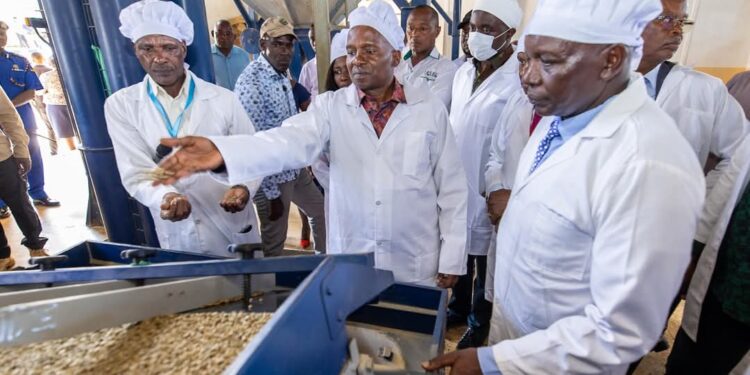The Kenya Kwanza government’s commitment to agricultural reforms is bearing fruit, with deliberate interventions significantly improving the livelihoods of Kenyan farmers. Speaking at a major consultative engagement in Runyenjes, Embu County, Deputy President Kithure Kindiki emphasized that the agriculture sector is experiencing positive transformation, in line with Kenya Kwanza’s manifesto pledges. Over 5,000 coffee farmers and leaders from 24 cooperative societies gathered to celebrate the impact of these reforms.
One of the key interventions highlighted by DP Kindiki is the fertilizer subsidy program. By subsidizing fertilizer prices, the government has made this crucial farm input more accessible to farmers, resulting in increased crop yields and improved food security. Farmers, particularly those in the coffee sector, are now able to access high-quality fertilizers at affordable rates, boosting their productivity and incomes.
In addition to fertilizer subsidies, the government has introduced hybrid seeds to enhance crop resilience and yields. These seeds are specially engineered to withstand pests, diseases, and changing climatic conditions. Farmers who previously suffered losses due to poor seed quality are now reporting better harvests, which is steadily lifting rural incomes and boosting Kenya’s agricultural output.
Coffee farmers, in particular, are experiencing unprecedented benefits. For the first time in 35 years, coffee prices have surged to between Ksh 120 and Ksh 148 per kilogram of cherry. This remarkable achievement underscores the success of Kenya Kwanza’s deliberate policies aimed at revitalizing the coffee sub-sector. Farmers who once struggled with low returns are now reaping better profits from their hard work.
The government is also streamlining the fertilizer subsidy program specifically for coffee farmers and is set to introduce new legislation governing the coffee and cooperative sectors. According to Kindiki, these legal frameworks will be enacted and assented to within the next two months, ensuring that reforms are institutionalized and their gains protected for future generations.
Another significant government intervention is the fast-tracking of the verification process for debts owed to coffee cooperative societies. By ensuring that only legitimate claims are honored, the government will roll out a Ksh 6.8 billion debt waiver to relieve farmers and cooperatives of historical financial burdens. This move is expected to unlock more capital for reinvestment in the coffee sector.
Moreover, to promote sustainability and modernization, the government is availing adequate coffee seedlings and subsidizing the cost of pesticides. An ambitious coffee infrastructure modernization programme has also been launched, aimed at upgrading processing methods to international standards. This will not only enhance the quality of Kenyan coffee but also increase its competitiveness in global markets.
In a bid to further strengthen the coffee value chain, the government has dismantled cartels that previously controlled milling, brokerage, and marketing. This bold move has opened up the market, allowing farmers to enjoy better prices and direct access to international buyers. The Kenya Kwanza administration is now aggressively marketing Kenyan coffee globally, positioning it as a premium product.
Deputy President Kindiki expressed optimism that these efforts are only the beginning. With continued government support and the resilience of Kenyan farmers, agriculture will become a major pillar of Kenya’s economy. He urged farmers to take advantage of these reforms and work closely with cooperative societies to maximize the opportunities available.
In conclusion, the Kenya Kwanza government’s deliberate interventions in the agriculture sector—ranging from fertilizer subsidies, hybrid seeds, debt waivers, infrastructure modernization, to global marketing efforts—are already transforming lives. Farmers across the country are witnessing real benefits, signaling a bright future for Kenyan agriculture under the Kenya Kwanza administration.










